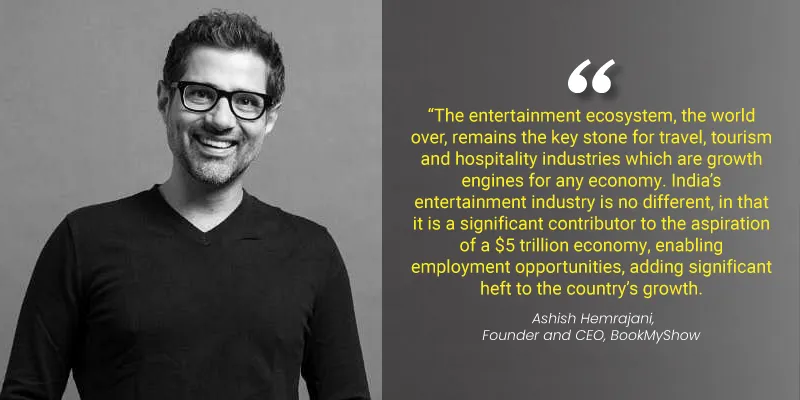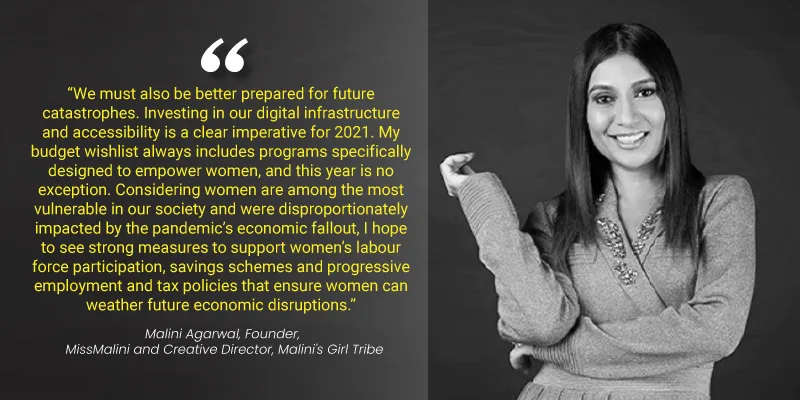Budget 2021: Tax relief, internet for all and increased credit tops entertainment industry’s expectations
After a year of staying away from movie theatres and binging on OTT, experts from the entertainment industry lay out their expectations from Budget 2021.
In 2020, the traditional entertainment industry suffered. While movie theatres and cinema halls were shut down for the most part of the year, OTT had a stellar year. Production houses then had to turn towards digital screens and released their films on OTT platforms such as Netflix, Amazon Prime, and Disney+Hotstar, among others.
A report by PwC suggests that the media and entertainment industry is expected to grow at an annual rate of over 10 percent, reaching $55 million by 2024.
In terms of individual segment market size, as a percentage of total industry revenue, OTT is expected to see the largest gain. On the other hand, cinema revenues will drop by 2.6 percent CAGR.

Image source: Shutterstock
On the other hand, with billboards losing their charm, consumer companies were quick to recognise trends and reached out to the social media content creators for more meaningful advertisements. The influencer marketing sector recorded a huge spike. The pandemic, thus, saw the rise of several internet influencers, even from towns beyond metros.
As movie theatres try to lure movie watchers back to the cinemas and struggle to coexist with OTT, and digital creators figure a way out to monetise their content, Budget of 2021 will play a pivotal role on how the entertainment industry of India shapes up next year.
Expectations from key players in the entertainment industry:
Ashish Hemrajani, Founder and CEO, :
“India’s live entertainment industry requires that the government broad-base the ecosystem through favourable regulatory policies, such as easing infrastructure roadblocks, rationalising the extremely high GST rates with India’s cinema industry and bring it at par with global industry standards as also enabling single window clearances to make out-of-home entertainment accessible to millions of Indians. Taxation on live entertainment across several developed and developing nations around the world have been reined in at sub-five percent levels, and if we aspire to make India a truly sustainable, global destination for entertainment at scale, it is imperative to adopt global models on regulation and policy.”

Niranjan Gidwani, independent consultant director and former CEO of Eros Group, Dubai:
“Heading into 2021, the government, telecommunications, media, and entertainment industry leaders should consider the following key strategic opportunities to recover from the COVID-19 crisis and to boldly position themselves to thrive in the future:
- Focus needs to shift to customers needs and better customer engagement
- Entertainment experiences for the end consumer should be recreated through new and innovative service offerings and entertainment bundles — and by adopting new strategies that can enable business agility and speed
- Rapid professionalisation of industry and encouraging startups
- Government to encourage the faster rollout of 5G and advanced wireless networks through new products, services, better sops to business.”
Malini Agarwal, Founder, MissMalini and Creative Director, Malini's Girl Tribe
“The government’s first priority must be to consider society’s most vulnerable and ensure their stabilisation and recovery, otherwise the existing disparities will only be exacerbated in the years ahead. Extending loan moratoriums, debt forgiveness, targeted tax breaks, and increased credit facilities at accessible rates are just some common-sense measures that can help. However, these need to be designed smartly beyond the short term so they don’t just pile up crippling debts for another day.”

Ranveer Allahbadia aka BeerBiceps, digital content creator, entrepreneur, and podcaster:
"Media businesses have exhibited remarkable growth recently especially with programmes like BharatNet — the world's largest rural broadband project. The goal is to provide internet access to 2.5 lakh gram panchayats across India. With the surge in content consumption across OTTs and social media platforms across various regional languages, the entertainment industry is no longer limited to just Bollywood and cricket.
"With distribution getting more decentralised, we have seen creators from the remotest cities of India gather millions of followers on their social media channels. We are seeing a heavy increase in the rise of content creators, not just from metro cities and privileged backgrounds but from Tier-II and III cities as well. If the government could create programmes to educate and encourage these creators and incentivise them to pursue content creation, we could see a lot more media entrepreneurs than just job seekers over the next 10 years."
Raveesh Jaiswal, Founder, Bombay Theatre Company:
"This Budget is very crucial as it will be poised to improve and further stabilise the disturbed economy due to the pandemic. Apart from focusing on increasing the spending power of the public, this Budget should provide the much-needed tax and service cost reliefs to the various performing arts venues which were mostly dormant in the past year and will anyway face huge cost pressures majorly due to the new safety norms like limited seating capacity and sanitisation protocols."

Abhi and Niyu, digital content creator-duo:
“Our expectations are for the government to provide the industry support to earn more money overseas through distribution. Indian entertainment especially through short films truly has the potential to earn from streaming online. The Films Division can provide support to filmmakers to market their art abroad. India also has excellent writers who can earn foreign exchange from publishing books and writing articles online. Some clear policy decisions helping freelancers would be appreciated and help a lot of people earn passive income online."
Varun Mayya, education influencer and Founder of :
“A solid provision or incentive by the government to boost individual content creators efforts would not only create employment at a micro level but also align with the government's vision of an Aatmanirbhar Bharat at a macro level."
Madan Gowri, South India's biggest YouTuber:
"In Budget 2021, The government must invest in digital learning materials for kids. The lockdown has made us understand the importance of gadgets and software for the future of education. These are one time investments that will go a long way in our education system"
Madhureeta Anand, independent filmmaker and writer:
“The Budget should use this time to address the central issue which is of concern — taxation. Taxes must be brought down. Additionally, insurance schemes for freelancers must be brought in so that they can access minimum basic incomes if a situation like COVID-19 arises again.“
Aditya Kripalani, independent filmmaker:
“I feel if there was less taxation on the income received by producers from OTT platforms. For example, if my film is sold to Netflix, the tax on it should be less because this whole year everyone has only been able to manage mental health because of OTT platforms. That would be a good thing in the Budget.”
Ambar Chakravarty, director and Creative Head, Addict Studios India:
“The priority of the Budget should obviously be to restore the economy and to restore the livelihoods of the people affected by the pandemic. For the entertainment industry, that would mean taking care of the blue-collar workforce i.e. the technicians, non-contractual workers and daily wagers through direct benefits and indirect measures like lowering of the entertainment tax to incentive cinema-goers. People need to get back to the theatres in a safe and manageable way for shoots to restart in full capacity. In general, some thinking should also be given to promoting and protecting the interests of independent filmmakers like us who have taken an especially hard hit in the last year. Any initiative to encourage and incentive them would be very welcome.”
For YourStory's multimedia coverage of Budget 2021, visit YourStory's Budget 2021 page or budget.yourstory.com
Edited by Saheli Sen Gupta









